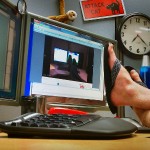 Whilst social media usage at work remains a bone of contention, with executives reporting that they are not very keen on employees using it at work, despite doing it a considerable amount themselves, there is a clear sense from studies that taking social media breaks is a boon for productivity.
Whilst social media usage at work remains a bone of contention, with executives reporting that they are not very keen on employees using it at work, despite doing it a considerable amount themselves, there is a clear sense from studies that taking social media breaks is a boon for productivity.
Indeed, recent research into this suggested that a 22 minute collection of breaks to play games throughout the day reduced stress considerably at the end of it. The research suggested that taking regular small breaks throughout the day enabled employees to significantly improve their stress beating capabilities, thus making them happier at the end of the day, and of course more productive during it.
Another study however, takes a slightly more controversial line, suggesting as it does that those benefits are primarily evident amongst the millennial generation, and not their older peers.
At the heart of the study was our ability to concentrate on the things that matter at work, which is of course a serious concern in our modern environment of hyper-distractivity. The researchers wanted to test whether workplace Internet leisure browsing (WILB) actually helps with our attentiveness when it really matters.
According to the study, “WILB is the act of using the company Internet for personal reasons during work hours, which might include watching YouTube movies, engaging in social media sites such as Facebook, or doing any other activity that might be construed as personal Internet use outside of organizationally set tasks.”
The researchers split participants into four groups, each of which received a different kind of break throughout their work day. One group would receive a WILB break (which consisted of using Facebook for 5 minutes), another could surf the web for an insurance deal, another could have a stationary break, whilst the final unfortunate group received no break at all. It emerged that those in the WILB group suffered a lesser amount of task vigilance decay than their peers in the other three groups.
A second study saw nearly 3,000 office workers, from across the demographic profile, surveyed about their attitude towards WILB. The data from the survey suggested that the attentional benefits of WILB is limited to younger employees, due in large part it is suggested, by their appreciation and comfort with technology.
“The implication of this research for managers is that WILB should not necessarily be treated as ‘cyberloafing,’ whereby perpetrators should be punished. Although excessive WILB may negatively impact worker performance by consuming time that would otherwise be spent performing work-related tasks, the present research suggests positive benefits within reasonable limits,” the study concludes. “An interesting avenue for future research would be to examine how motivational factors might moderate any effects of WILB productivity.”
I don't buy this 'millennials are different' thing. Surely people are different, regardless of their age?